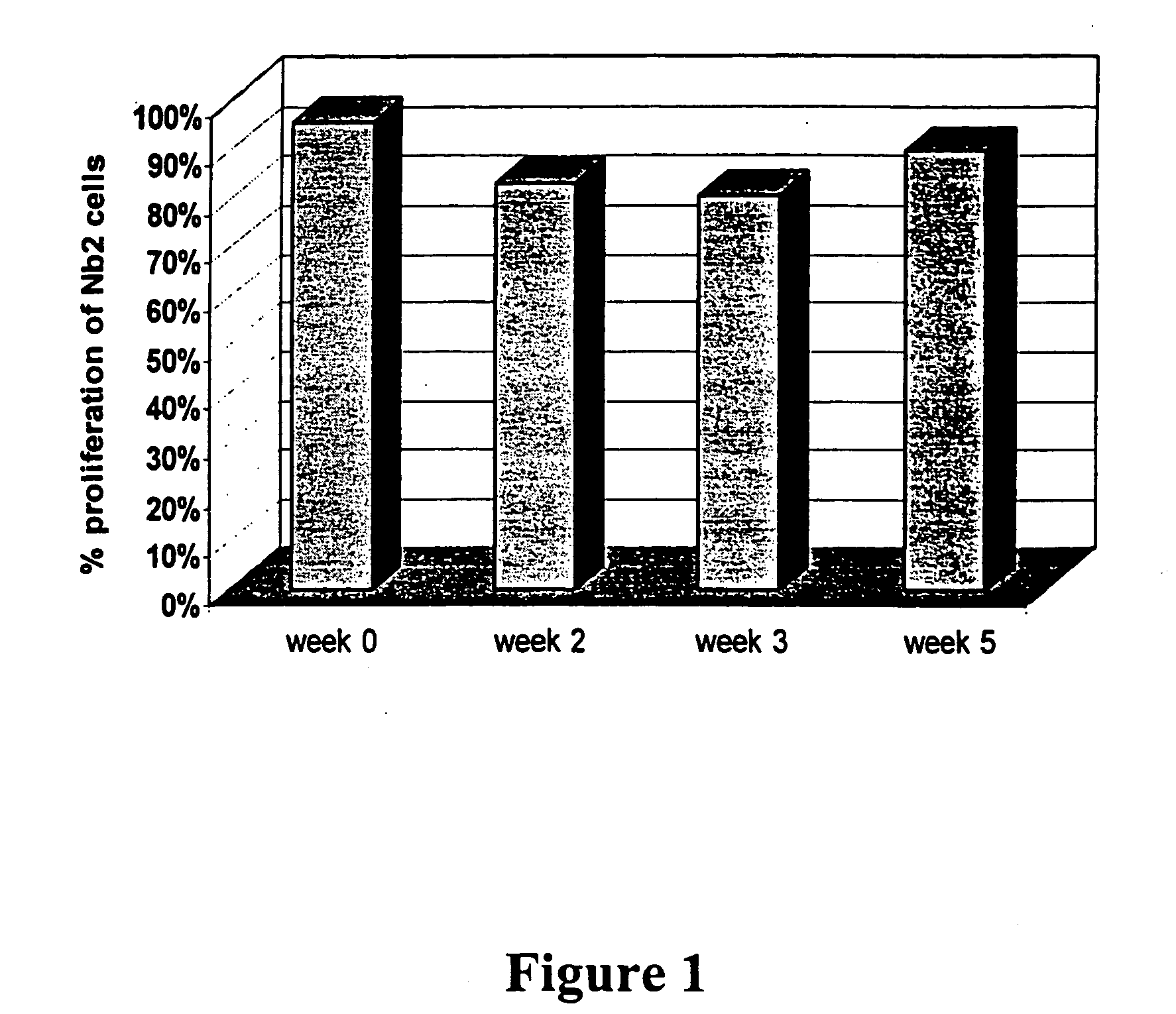Albumin fusion proteins
a technology of fusion proteins and albumins, applied in the field of therapeutic proteins, can solve the problems of difficult transport and/or storage of molecules, particularly acute storage problems, undesirable and expensive features, etc., and achieve the effects of prolonging shelf life, stabilizing protein and/or its activity, and retaining therapeutic protein activity
- Summary
- Abstract
- Description
- Claims
- Application Information
AI Technical Summary
Benefits of technology
Problems solved by technology
Method used
Image
Examples
example 1
Preparation of HA-hGH Fusion Proteins
[0836] An HA-hGH fusion protein was prepared as follows:
[0837] Cloning of hGH cDNA
[0838] The hGH cDNA was obtained from a human pituitary gland cDNA library (catalogue number HL1097v, Clontech Laboratories, Inc) by PCR amplification. Two oligonucleotides suitable for PCR amplification of the hGH cDNA, HGH1 and HGH2, were synthesized using an Applied Biosystems 380B Oligonucleotide Synthesizer.
(SEQ ID NO: 1)HGH1: 5′-CCCAAGAATTCCCTTATCCAGGC-3′(SEQ ID NO: 2)HGH2: 5′-GGGAAGCTTAGAAGCCACAGGATCCCTCCACAG-3′
[0839] HGH 1 and HGH2 differed from the equivalent portion of the hGH cDNA sequence (Martial et. al., 1979) by two and three nucleotides, respectively, such that after PCR amplification an EcoRI site would be introduced to the 5′ end of the cDNA and a BamHI site would be introduced into the 3′ end of the cDNA. In addition, HGH2 contained a HindIII site immediately downstream of the hGH sequence.
[0840] PCR amplification using a Perkin-Elmer-Cetus ...
example 2
Preparation of HA-Fusion Proteins
[0884]FIG. 4 shows a map of a plasmid (pPPC0005) that can be used as the base vector for cloning the cDNAs of therapeutic partners to form HA-fusions. For example, digestion of this vector with the restriction enzymes Bsu36I / Partial HindIII will allow for the insertion of a cDNA modified at the 5′ end to encode the last 5 amino acids of HA including the Bsu36I site and at the 3′ end to include a double stop codon and HindIII site. As another example, digestion of this vector with the restriction enzymes Bsu361I, SphI allows for the insertion of a cDNA modified at the 5′ end to encode the last 5 amino acids of HA including the Bsu361 site and at the 3′ end to include a double stop codon, HindIII site and the ADHI terminator sequence up to and including the SphI site.
[0885] This plasmid may easily be modified by one of skill in the art, for example, to modify, add or delete restriction sites so that one may more easily clone a Therapeutic protein, or...
example 3
Preparation of HA-Cytokine or HA-Growth Factor Fusion Proteins (such as EPO, GMCSF, GCSF)
[0898] The cDNA for the cytokine or growth factor of interest, such as EPO, can be isolated by a variety of means including from cDNA libraries, by RT-PCR and by PCR using a series of overlapping synthetic oligonucleotide primers, all using standard methods. The nucleotide sequences for all of these proteins are known and available, for instance, in U.S. Pat. Nos. 4,703,008, 4,810,643 and 5,908,763. The cDNA can be tailored at the 5′ and 3′ ends to generate restriction sites, such that oligonucleotide linkers can be used, for cloning of the cDNA into a vector containing the cDNA for HA. This can be at the N or C-terminus with or without the use of a spacer sequence. EPO (or other cytokine) cDNA is cloned into a vector such as pPPC0005 (FIG. 4), pScCHSA, pScNHSA, or pC4:HSA from which the complete expression cassette is then excised and inserted into the plasmid pSAC35 to allow the expression of...
PUM
| Property | Measurement | Unit |
|---|---|---|
| composition | aaaaa | aaaaa |
| nucleic acid | aaaaa | aaaaa |
Abstract
Description
Claims
Application Information
 Login to View More
Login to View More - R&D Engineer
- R&D Manager
- IP Professional
- Industry Leading Data Capabilities
- Powerful AI technology
- Patent DNA Extraction
Browse by: Latest US Patents, China's latest patents, Technical Efficacy Thesaurus, Application Domain, Technology Topic, Popular Technical Reports.
© 2024 PatSnap. All rights reserved.Legal|Privacy policy|Modern Slavery Act Transparency Statement|Sitemap|About US| Contact US: help@patsnap.com










